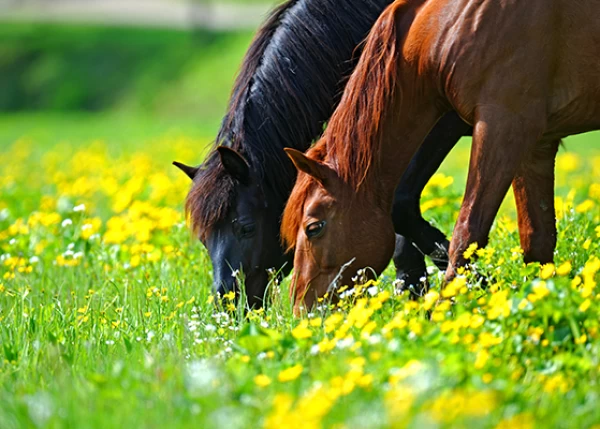PLANT BIOACTIVES AND EXTRACTS AS FEED ADDITIVES IN HORSE NUTRITION
02/02/2024
SUMMARY:
This article dealt with the review of reports from recent studies investigating the usage of plant bioactives or extracts in horse nutrition. For the time being, several herbs, either alone or in composites, are being commercialized and openly available in horsemarket stores, which makes it difficult and confusing for horse owners and veterinarians to make a justifiable choice.
Usage of ginger extract as a feed additive in sport horses is encourageable as it manages to attain quick recovery after exhaustion in racing and jumping events. Garlic, ginseng, primerose, and rose hip possess potent antioxidative properties, and their supplementation in a regular diet may lessen the chance of occurrence of oxidative stress-related diseases.
Owing to their cytoprotective and mucus-stimulatory effects, licorice and Aloe vera extracts have potentiality as feed additives in Standardbred and Thoroughbred racehorses, as they are more prone for equine gastric ulcer syndrome. Echinacea is able to stimulate the equine immunocompetence on addition to the regular diets of equine species. Besides the anti-inflammatory effect, devils claw possess anorexigenic effect, which can limit feed intake, thus keeping the body condition score in check and avoiding obese-related health problems in horses. Regularizing flaxseed meal or its extract as a dietary supplement may support healthy skin and coat condition due to the presence of omega-3 fatty acids as an active component. Aloe vera, well known for cytoprotective and mucus-stimulatory effects, is found to be efficient in protecting the gastrointestinal tract against ulcers or other disorders on administering as a dietary supplement to equines, but the extent of effect depends on the dosage and extent of supplementation.
Although, theoretically plant extracts application is safer compared with synthetic antibiotics or drugs, it does not mean they are completely safe, and few considerations should be given for dosage of the drug, period of administration, apart from monitoring parallel drugs given to prevent herb-drug interactions. The plant extracts with potent benefits, and not tested in horses have to be evaluated with a primary objective to verify the negative side effects, if any, followed by standardization of the dosage.
FULL DOCUMENT:


